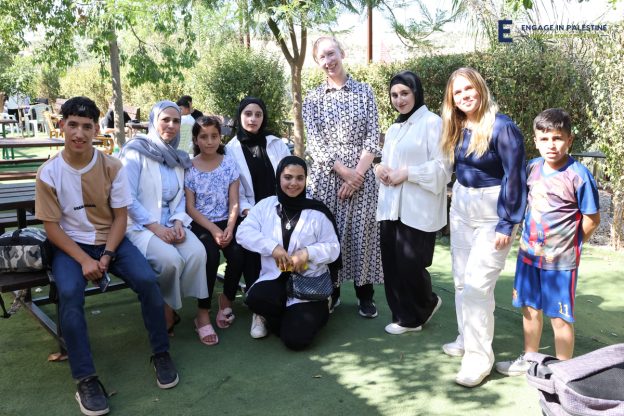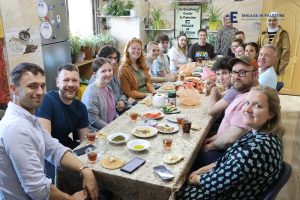Important Facts About Palestine: Few people know what life really looks like in Palestine. They probably know the term “Israeli-Palestinian conflict,” have heard about rising tensions and Israeli security concerns, or seen images of Israel and Gaza exchanging rocket fire in the media. At the same time, they probably know little about Palestine and Palestinian culture, and know even less the fundamental implications of daily life under occupation.
In reality, life is logistically more difficult for Palestinians due to the occupation by Israel, which has been ongoing for over 70 years now. The times in which Western media focuses on the conflict is usually after a significant event and increased tensions, thus skewing the perception of life in Palestine while perpetuating travelers’ concerns over safety and a “both sides” narrative.
So what does it mean to live under occupation, and how is life different?
Table of Contents
Palestinians Don’t Have an Airport
Normally when you want to travel somewhere, you take your bag and head to the airport. Travel for Palestinians, however, is not so simple as they do not have an airport accessible from the Territories. Gaza did have an airport at one time, however, it did not remain operational for long.
Upon its completion in 1998 for $86 million, the Yasser Arafat International Airport was equipped with three jets and had just begun flights to neighboring countries including Egypt, Saudi Arabia, and Jordan.
However, the airport closed in 2000, and in 2001 during the Second Intifada, Israeli Defense Forces destroyed the airport’s radar station and control tower. Since then, Palestinians have had to travel to airports either in Egypt or Jordan, depending on whether they live in Gaza or the West Bank. Ideally, it would be easier to travel through the Ben-Gurion International Airport located in Tel Aviv, however, the Palestinians are barred from using this airport due to Israeli concerns over security. While some Palestinians are granted special permission to travel through this airport, such instances are rare. Therefore, flying abroad as Palestinians poses several challenges, in addition to excess travel expenses, which they must consider when making their plans.
Palestinians Cannot Travel Between Palestinian Cities Freely
As hard as it may be to imagine, Palestinians are forced to stop at various checkpoints when traveling between cities for both work and pleasure. Some checkpoints are fixed (i.e. permanent and stationary), while others are known as “flying,” meaning they are temporary and undisclosed.
At either type of checkpoint, Palestinians must show their IDs while their luggage and vehicles are searched. In some cases, Palestinians have to wait hours before they are allowed to pass through the checkpoints. On occasion, these checkpoints close (such as for Jewish holidays) forcing Palestinians to either return home or traverse rugged side roads. This means Palestinians lack the same freedom of movement that people in other countries rightly enjoy.
There are Palestinian Refugees Outside AND Inside Palestine!
Nearly 5 million Palestinians live as refugees in the neighboring countries of Jordan, Syria, Egypt, and Lebanon. In addition, numerous Palestinians are living in refugee camps within the West Bank and Gaza. There are also around 600,000 refugees living in Europe and elsewhere outside of the region.
Israel hosts no Palestinian refugees since many of these people were expelled or fled during the events of 1948 (known as the Nakba) and the Six-Day War of 1967, or are their descendants. Many Palestinians, whether in the Occupied Palestinian Territories or elsewhere in the diaspora, hope they will one day be able to return to the properties they or their ancestors once owned.
Palestinians Have No Control Over Their Borders
The Palestinian Authority has the authority to administer internal Palestinian affairs within the West Bank and the Gaza Strip, however, they have no power to control or regulate travel into the Territories or out through bordering countries.
The Palestinian Authority cannot issue visas to anyone who wants to enter Palestine, and as such visitors who are eager to travel to the West Bank or Gaza must get a visa from the Israeli authorities to be granted entry.
Palestinians Have a Limited Ability to Import or Export Products and Goods
Because Palestine is under occupation, certain restrictions have been imposed on Palestinians. This includes Palestinians’ ability to import international products or export their resources and goods. There are also certain types of products Palestinians are not allowed to export, except to Israel.
Many of these products have been made by Palestinians within Palestine but are labeled “Made in Israel” at the time of their export. Palestinians importing goods from abroad are also required to pay additional taxes to the Israeli government, rather than the Palestinian Authority, thus decreasing their economic capacity and potential.
Life–and Resilience–Under Occupation
To conclude, everything is logistically more difficult when living under occupation, as Palestinians know firsthand. The Israeli occupation has meant travel abroad has additional hurdles and expenses, and movement within the Territories is limited by checkpoints, thus requiring extra lead time when traveling to work or for other reasons.
The West Bank and Gaza, already struggling to support the ancestral people of these areas, must also accommodate the refugee populations living there since 1948 and 1967, while modern telecommunication infrastructure is limited, in effect degrading the quality of communication. Finally, border regulations are outside the Palestinian Authority’s control, making access to and from the Territories more difficult for people and negatively affecting Palestine’s economy due to the additional hurdles of exporting and importing goods.
Final Remarks
Despite all this and more, though, Palestinians are a resilient people who continue to flourish in their ancestral lands. Olive harvests in the fall, poppies carpeting fields in the spring, knafeh, and soap of Nablus, thobes embellished with the traditional tatreez stitching, dabke at celebrations, the smell of maftoul and za’atar fatayer–these are the things you never hear about but will experience in Palestine, facets of the culture that exist even now. We invite you to experience Palestine beyond news articles and TV screens–Palestine as it exists for us every day.
Contact Us
Should you have any questions, please do not hesitate to contact us at:
WhatsApp:+972 599 479 880
Website: https://ecpalestine.org/
EC Website: https://excellencenter.org/
Instagram: https://www.instagram.com/excellence.center
Facebook page: https://www.facebook.com/ExcellenceCenter



